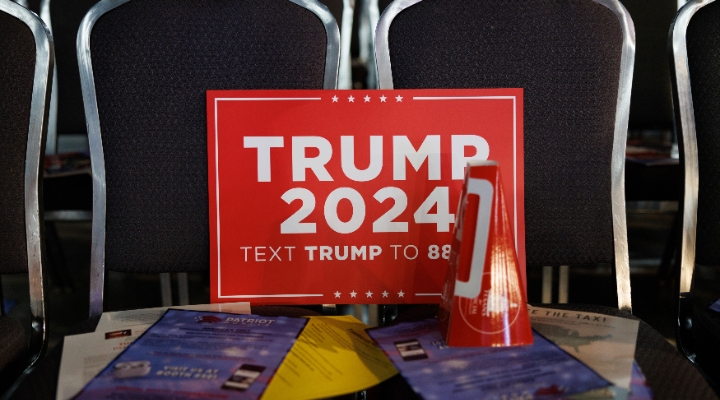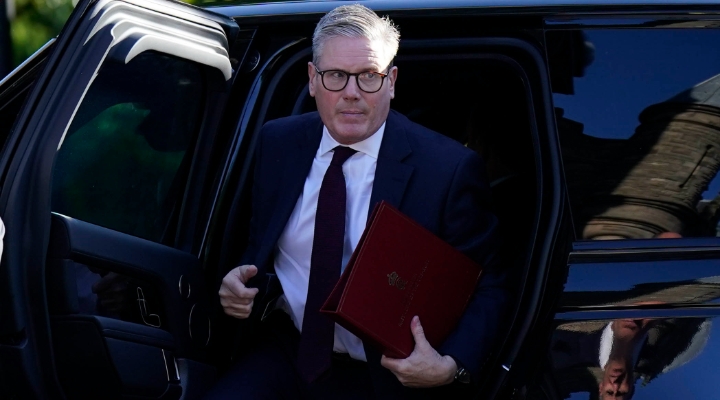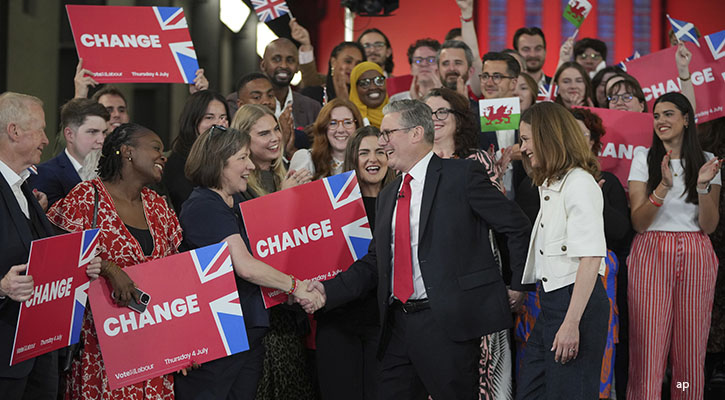
2024 is a year of elections. Across 50 countries, around 1.5 billion people will have taken to the polls by the end of the year, amid a great deal of political instability and conflict. In Europe, the far-right has returned and in the US former president Donald Trump has taken a lead in the polls.
While voters have to make one-off choices at the ballot box, fund managers have to make difficult asset allocation calls throughout the year. We spoke to some of them about how they are investing in times of political uncertainty.
In the UK, at least, there is a sense that stability has returned, and with it, UK equity overweights. Vivek Paul, global head of portfolio research and UK chief investment strategist at BlackRock, says there is a strong case for active management exposure to the country.
"I think what we've seen and what gives us the reason to be more optimistic about the UK space in general is that there's a perception we think that the market will have greater stability in the future," he says.
"That allows, I guess, a bunch of things in terms of the future opportunity set for investors. But it's all about this idea that there was a perception that you can see in the data the valuation gap that persisted because of a perception of political instability that's going to dissipate.
"That's the reason for us sort of getting more interested in terms of the UK notwithstanding the point that maybe the best way to capture some of that opportunity is an active sort of management of that exposure."
And then there is the question of Europe, and, specifically, France.
Political Stalemate in France
President Emmanuel Macron's gamble of a snap election has left France in a political purgatory. The first round of voting on June 30 resulted in far-right leader Marine Le Pen's Rassemblement National (RN) party winning 33% of the popular vote.
Second-round run-off voting on Sunday last week placed Le Pen's party in third, after Macron's centrists successfully co-ordinated with leftist parties under Nouveau Front Populaire to suppress Le Pen's ascent to power.
The result has left France in limbo with no party winning an outright majority in the 557-seat National Assembly. A new prime minister is yet to be appointed, as Morningstar France editor Jocelyn Jovene explains.
Michael Field, European market strategist at Morningstar, says a left-wing majority would not normally be beneficial for the markets. And yet this time it's different.
"The Nouveau Front Populaire manifesto outlines its wish to increase the minimum wage materially, as well as freeze energy and basic food prices," he wrote in a note.
"The manifesto proposes all these measures be funded by the re-introduction of a wealth tax and an increase in income tax for high earners. Given the inherent fears investors had around a right-wing government, this announcement will very likely be a welcome one."
French Stocks Under Pressure
While there are concerns about the impact of such policies on the utility sector, there is far more scepticism about whether a left-wing alliance would even be able to implement its programme in the first place. And Field notes that some French stocks are now undervalued after June and July's shocks: these include Gucci owner Kering (KER), BNP Paribas (BNP), Société Générale (GLE), AXA AXA, Engie (ENGI), Veolia (VIE), Edenred (EDEN) and Vinci (DG).
Thomas Becket, co-chief investment officer at Canaccord Genuity Wealth Management, is staying clear of European equities altogether.
"Quite simply the European growth trajectory and the political backdrop put together is rather stagnant," he says.
Instead, he argues, investors seeking opportunities in European equities should look for growth companies exposed to global growth trends, such as the luxury goods sector, rather than stocks that are dependent on Europe's domestic economies.
European Fixed Income More Attractive
That said, he doesn't rule out increasing exposure to European fixed income.
"Yields in Europe are lower than in other parts of the world but as a GBP investor when you hedge the currency back to sterling, because European interest rates are lower than UK rates, you do get a pickup in yield," he says.
"I would also argue some elements of European corporate credit remain quite attractive."
French bond markets sold off after the surprise election result which saw legislative victory for the left despite their lack of absolute majority. The French stock market fell after the snap election was called, but has managed a minor rally after a far-right majority was ruled out.
The rising popularity of far-right parties is not just a French phenomenon. Last month the European Union held elections that handed far-right parties their best wins in years, with major gains in Germany and Italy making the headlines.
Indeed, the growing popularity of far-right movements in Europe shows a broader shift to a more protectionist and populist world view, which some fear could hit the European Union more than other global players.
Nonetheless, Fernando Romero, portfolio manager at Madrid-based Abaco Capital, is sceptical of the long-term impact this will actually have on the eurozone economy.
"European elections generate a little bit of noise in the markets in the short term, just like they have in France," he says.
"But all in all, the European Union's institutions, and the fact we all share the euro as our currency, limits the changes that the newly elected candidates can make."
Labour Landslide and Housing Stocks
In the UK the Labour Party under Keir Starmer won a clear majority.
Though Romero is doubtful sceptical Starmer's Labour government will produce radical changes for Britain, Abaco Capital is itself buying UK stocks in the housing and construction sectors, suspecting that these stocks will boom under Labour. The companies' shares have already rallied this year in expectation of a Labour victory.
New chancellor Rachel Reeves has used her first week in the Treasury to announce a wholesale reform of the UK planning system, with compulsory housebuilding targets and green-belt building projects back on the table. Could this prompt a UK housing stocks rally?
Morningstar's Field said in a video this week that Labour's homebuilding target is very ambitious, but is tied closely with pledges made to voters and first-time buyers on the campaign trail.
"It's a level we haven't seen in the UK since the 1970s in terms of homebuilding. And who is going to be at the forefront to benefit from that? It's obviously the UK homebuilders, the big, listed guys like Persimmon, which is our top pick in the sector."
Michael Browne, chief investment officer of Martin Currie, welcomes the housing reform in particular, and, like Romero, has allocated significant sums to UK housing stocks as a result.
"For me it feels like a double-headed coin," he says.
"We have been through a decent growth trajectory, and actually in Europe, the UK is the only country with positive PMIs for construction, manufacturing, and services.
"We want to build more, rates are falling, affordability is increasing because overall by the end of this year, most people will recoup the real wage losses they suffered in 2023. So, you ought to own the housebuilders and the associated chain [downstream]."
That said, Browne believes that obstacles to planning reform may persist due to the length of time it takes to get projects off the ground. The chart below suggests investors are sceptical that housebuilders can meet these targets. He is also keeping an eye on renewables, after Ed Miliband, the new energy secretary, lifted the ban on onshore wind farms in the UK.
For Hiroki Hashimoto, senior fund manager of Royal London's global multi-asset portfolio range, Labour's win did not prompt a change in asset allocation within his funds. He does not rule one out in future, however.
"There are two things we will be watching out for: the impact of investor sentiment and how that gets priced into the market, and the key impact of inflation and growth on the UK business cycle."
He's also cautious about the sterling exposure in each of the multi-asset funds he runs.
"If you are in the defensive fund you need to have more sterling exposure for UK investors than global or foreign currencies," he says.
"If you do get more positive sentiment in the UK because of stability. that impacts sterling positively, but that's a negative for some investors in a way because it depresses the value of foreign assets.
"In our case we go for sort of a currency hedge, with higher-yielding fixed income assets alongside commercial property to offset the fact global equities could be challenged if we get a more positive outcome for the UK."
For its part, BlackRock says it is now overeight UK equities. Wei Lei, the company's global chief investment strategist, says valuations are attractive.
"We are now overweight in the UK equity market. There has long been a valuation case, right? So, the period before Brexit, before 2015, the average equity risk premium above US market for the UK equity market was 100 basis points and now the average premium for UK market above the US equity market is 300 basis points," she says.
"So that’s a big gap. Valuation is attractive. It has been the case for a while but now we have a catalyst of potentially perceived political stability that could act as a trigger for international sentiment to warm up towards the UK equity market and in the face of the attractive valuation gap. We think that there is a case to be positive."
America Elects: Biden vs Trump?
But the big electoral event is in the US. With former president Donald Trump leading incumbent Joe Biden in the polls after Biden's disastrously-incoherent TV debate performance, investors are preparing for a second Trump term.
"My first view has been that Trump will win the election," Becket says.
"My second view is that his administration will be much more pragmatic than people perhaps think. The last time round there were elements of chaos and uncertainty. But both [Trump and Biden] have had extremely questionable policies, both of which have just pointed towards the ruination of the US government's balance sheet and long term chaos because of the huge amount of debt that they have created for not a huge amount of return."
As such, Becket believes the environment for US Treasuries could become more volatile under Trump – whereas under Biden the US Treasury market may be calmer because it would represent the status quo. That said, a Biden re-election could be less positive for US equities, which have hit record highs this year, than a second Trump presidency.
"If the Republicans control both the Senate and the House of Representatives and Trump is in power, then you have got a situation with potentially much greater tail risks than if there were more checks and constraints on the power of the President," he says.
"Our asset allocation views are being driven by economic growth being solid but unspectacular, and a global recession being avoided, as well as inflation continuing to decrease.
"All the while, we know politics and geopolitics will keep throwing short-term surprises for us to try and sail through – just as they have throughout this turbulent decade."








.jpg)





















